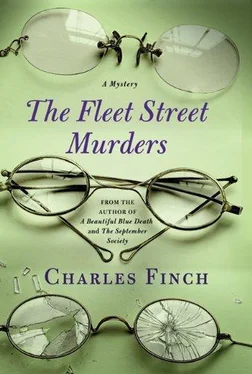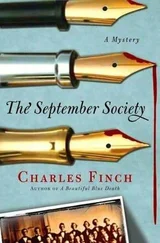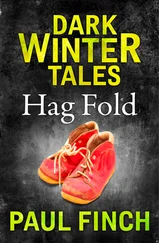Charles Finch - Fleet Street murders
Здесь есть возможность читать онлайн «Charles Finch - Fleet Street murders» весь текст электронной книги совершенно бесплатно (целиком полную версию без сокращений). В некоторых случаях можно слушать аудио, скачать через торрент в формате fb2 и присутствует краткое содержание. Жанр: Исторический детектив, на английском языке. Описание произведения, (предисловие) а так же отзывы посетителей доступны на портале библиотеки ЛибКат.
- Название:Fleet Street murders
- Автор:
- Жанр:
- Год:неизвестен
- ISBN:нет данных
- Рейтинг книги:5 / 5. Голосов: 1
-
Избранное:Добавить в избранное
- Отзывы:
-
Ваша оценка:
- 100
- 1
- 2
- 3
- 4
- 5
Fleet Street murders: краткое содержание, описание и аннотация
Предлагаем к чтению аннотацию, описание, краткое содержание или предисловие (зависит от того, что написал сам автор книги «Fleet Street murders»). Если вы не нашли необходимую информацию о книге — напишите в комментариях, мы постараемся отыскать её.
Fleet Street murders — читать онлайн бесплатно полную книгу (весь текст) целиком
Ниже представлен текст книги, разбитый по страницам. Система сохранения места последней прочитанной страницы, позволяет с удобством читать онлайн бесплатно книгу «Fleet Street murders», без необходимости каждый раз заново искать на чём Вы остановились. Поставьте закладку, и сможете в любой момент перейти на страницу, на которой закончили чтение.
Интервал:
Закладка:
Lenox nodded. “You were right there, but why not flee sooner, George?”
“I knew you weren’t the precipitate sort. You would tease out whatever information you could until you were certain. I knew I had time. More time, if it weren’t for Carruthers and Exeter. It was those two who… hastened my plans, shall we say.”
Here they came to it. “Why did they die?” asked Lenox in a carefully neutral voice, inviting the confidence of the man with the gun.
Barnard laughed. “You’re awfully good, you know. I quite forgot for a moment that we were anything other than old acquaintances. No, it’s not important.” Suddenly he became businesslike. “Look, in”-he checked his pocket watch-“in fifteen minutes this will be over. Here’s some paper. Why not write a note to Jane?”
Lenox felt a wave of panic that almost prostrated him; he thought in sudden succession of his brother, of his childhood, of his little house on Hampden Lane, and above all of Jane-and suddenly life seemed so dear and so wonderful that he would have done anything to hold on to it.
“Simon Pierce-that was to mislead the Yard?”
Barnard laughed yet again and checked his watch. “Yes, of course,” he said.
“How did you find out that Carruthers and Pierce had both been witnesses against Jonathan Poole?”
“Carruthers told me. He was a fearful talker, you know. Told me the first time we ever met, practically. Trying to impress me.”
“He was the real target, then? Carruthers?”
“Yes,” said Barnard. “Of course.” He looked uneasy. “I never heard much good of Pierce, either.”
“Hiram Smalls was trying to become a Hammer?”
“Yes.”
“His mother’s debt?”
This unnerved Barnard. He had been speaking in a rather bored way, but now he looked at Lenox inquiringly. “How much do you know?” he said.
“Some.”
“I didn’t kill anyone, of course.”
“Of course. Only your proxies did.”
“Well-but that’s important. Gerald Poole was a crazed young man.”
“Who happened to run into Martha Claes, a tavernkeeper from his adolescence.”
“Now, how in damnation do you know that?”
“From Poole,” said Lenox. He decided to be as honest as possible. It might unsettle Barnard; might buy time.
“Well, there’s no use denying that I had a hand in all of it.”
“Why Carruthers, George? What did he suddenly discover?”
Barnard looked at Lenox, again with that smirk. “He found out I was going to rob the Mint. Found out I was going to leave England.”
“How?”
Barnard laughed. “It’s funny, isn’t it,” he said. “Life, I mean. He found out because of an article I paid him to write. I needed some research on the architecture of this place and didn’t dare ask for it myself. I must have overplayed my hand with him. Asked him about getting in and out of here unnoticed. He twigged to it and challenged me face-to-face with what he suspected.”
“He threatened to expose you?”
“Yes,” said Barnard. “Unless I paid him.”
“Why didn’t you?”
“I would have. He knew too much, though.”
Suddenly a man in a low black cloth cap came in. “Ready,” he said, not sparing a glance for Lenox.
Barnard did, however, and grinned. “Coins are awfully heavy things,” he said, almost as if he were showing off.
“Notes?” said Lenox.
“White notes are quite lovely. We meant to come back tomorrow night, too, but why be greedy?” He laughed loudly and then turned back to his man.
A dozen years ago, the pound and two-pound notes of England had been handwritten; now they were printed in black on the front, with a blank white back. They would be infinitely more portable, of course. With any concerted effort Barnard might make off with a hundred thousand pounds, enough to make his entire career of thievery irrelevant by comparison.
“Don’t do this, George,” said Lenox.
Barnard ignored him. “All loaded?” he said.
“Yes, sir.”
Then all of a sudden two things happened.
In the hallway a voice-Jenkins’s voice-shouted, “Lenox! Where are you? The building is surrounded, Mr. Barnard!”
Lenox, taking advantage of the surprise and consternation on the faces of Barnard and his compatriot, pulled from his leather kit bag a tiny, pearl-handled revolver, which held one bullet-and shot George Barnard, certain that it would have been the other way around if he waited a moment longer.
CHAPTER FORTY-SIX
Barnard shouted, “Run!” and, clutching his stomach, turned and bolted before Lenox could reload.
The two men sprinted away, and Lenox got to his feet, reloaded the tiny gun, and started after them. Jenkins’s loud footsteps were pounding toward the noise, and at the door to Barnard’s office the two men met.
“That way!” said Lenox.
It was to no avail. They searched the building’s every hall, and in two or three minutes police constables were swarming the place. They found nothing, other than a vault left half open.
Lenox and Jenkins went out to the courtyard, where Graham was waiting. A trio of constables rushed to Jenkins and reported that they had found nothing.
“Damn it!” said Jenkins, looking hopelessly in every direction. “They’ve simply vanished! We had men on every block, at every exit! Where on earth did they go?”
“They must still be in the building,” said one of the constables.
Suddenly Lenox saw it. “No,” he said. “The river. They’ve gone by boat.”
“Are you sure?”
“I am. Carruthers’s article about the Mint-all the hidden passageways. It’s like the Tower of London. There must be a tunnel or a gate leading directly onto the water.”
“Christ,” muttered Jenkins. “We must put in for a boat from the Yard.”
“There’s no time for that,” said Lenox. “Will you lend me two men?”
“Of course,” said Jenkins. “What do you mean to do?”
“For a dozen reasons they can only be headed east, out of town, rather than west and back through the heart of London. We’ll follow them.”
“Why are you so sure they’re going east?”
Impatiently Lenox ticked off the reasons. “The Thames is only a few hundred yards wide in London-they’d be far too conspicuous. They’ll want to unload somewhere quiet-again east. Barnard as much as admitted he’s leaving England-the eastern coast.”
As if by confirmation of all this, a constable came sprinting toward Jenkins and breathlessly told him that Barnard and his men had been spotted on a makeshift barge but that it was already out of sight.
“Two men?” said Lenox.
“I’m coming, too,” said Jenkins. “Althorp, you stay here and manage the men. Send a team down east in a carriage to look for the barge and track their progress. I’m coming, Lenox.”
“As am I,” said a voice behind them in the courtyard.
It was Dallington.
“How did you discover us?” asked Lenox.
Dallington laughed. “I have to confess-I followed Jenkins. My man was watching the Yard. I couldn’t stand being outside of things. Where are we going?”
There was no time to be upset with Dallington, and in a way Lenox admired his pluck. Soon they had organized a small party, and, running the short distance to the river, Lenox found the smallest, quickest skiff he could, cut it loose, and left Graham behind with money to pay its owner. He, Jenkins, Dallington, and two constables boarded the skiff and instantly started to push out into the wide, rippling Thames.
For twenty minutes there was nothing. They took turns poling the lively little bark down the river, sticking close to the side and peering keenly forward.
“Damned cheek,” said Dallington indignantly. “To think of him stealing from the Mint!”
Читать дальшеИнтервал:
Закладка:
Похожие книги на «Fleet Street murders»
Представляем Вашему вниманию похожие книги на «Fleet Street murders» списком для выбора. Мы отобрали схожую по названию и смыслу литературу в надежде предоставить читателям больше вариантов отыскать новые, интересные, ещё непрочитанные произведения.
Обсуждение, отзывы о книге «Fleet Street murders» и просто собственные мнения читателей. Оставьте ваши комментарии, напишите, что Вы думаете о произведении, его смысле или главных героях. Укажите что конкретно понравилось, а что нет, и почему Вы так считаете.












